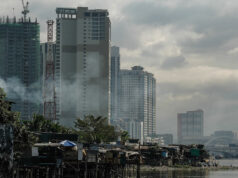Reclamation projects under Palace watch
MALACAÑANG — which has cracked down on businesses polluting Boracay and Manila Bay — has assumed closer oversight of reclamation projects by placing the agency responsible for them under its direct supervision.
Executive Order No. 74 — signed by President Rodrigo R. Duterte on Feb. 1 and distributed to reporters on Monday — repealed EOs 798 and 146 that had transferred the Philippine Reclamation Authority (PRA) to the Department of Environment and Natural Resources (DENR) from the Department of Public Works and Highways in 2009 and then, in 2013, transferred PRA powers to approve reclamation projects to the National Economic and Development Authority (NEDA) Board, led by the President, while allowing PRA to continue processing, evaluating and recommending the approval of such projects to the board.
Citing “a need to rationalize the approval process for reclamation projects towards economically and environmentally sustainable resource development” — taking into consideration their “environmental, social and economic impacts” — EO 74 transfers the PRA to “the control and supervision” of the Office of the President, with “the power of the President to approve all reclamation projects… delegated to the PRA Governing Board.”
“Such delegation, however, shall not be construed as diminishing the President’s authority to modify, amend or nullify the action of the PRA Governing Board,” the order read, adding that “all proposals for reclamation projects shall be evaluated by the PRA based on their cumulative impacts rather than on a specific project basis.”
“Every proposed reclamation project shall be accompanied by hydrodynamic modelling — except for relatively small reclamation projects of less than five hectares — and detailed horizontal and vertical development plans.”
For each project, the PRA will have to seek the opinions of NEDA to ascertain consistency with national and regional development plans and priorities, of DENR to ensure compliance with environmental laws and regulations, of the Department of Finance to ensure economic and financial viability and joint venture deals’ consistency with laws, as well as coordinate with affected local governments.
The order reiterated that the PRA cannot approve any project without the required area clearance and environmental compliance certificate from the DENR.
EO 74, which takes immediate effect, applies to all reclamation projects — including those initiated by local governments, government-owned or -controlled corporations and other state entities allowed by law to reclaim land — “for which there are no contracts/agreements yet executed between the government entity concerned and a private sector proponent prior to the effectivity of this order.”
That provision, Infrawatch PH Convenor Terry L. Ridon said in a press statement on Monday, “removes all pending Manila Bay reclamation projects from the ambit of the EO because all pending applications had already been subject, at the very least, to a memorandum of understanding (MoU) between the local government unit and a private proponent.”
“It is absurd, even unthinkable, to issue a new reclamation policy while exempting from its coverage the nation’s most controversial reclamation area. This only lends credence to lingering questions on the sincerity of government in rehabilitating Manila Bay.”
Sought for comment, Presidential Spokesperson Salvador S. Panelo said in a press briefing in Malacañan Palace: “Pag MoU pa lang, di wala pang kontrata… Iba ‘yung memorandum of agreement, kontrata ‘yun eh (An MoU is not a contract… whereas a memorandum of agreement is a contract).”
Asked for the reason behind Mr. Duterte’s change in tack on reclamation project approval, Mr. Panelo replied: “He feels na mas maganda kapag under the Office of the President, kasi pag under Office of the President mabilis ang takbo ng lahat ng ahensiya ng gobyerno eh (all government agencies will act faster on projects).” — Arjay L. Balinbin



